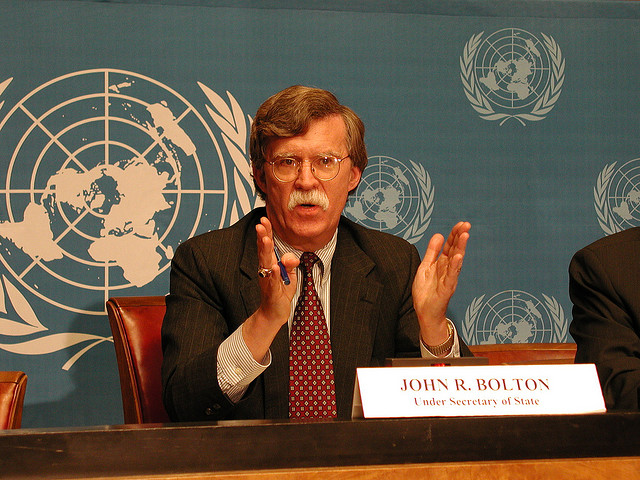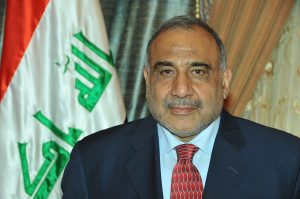by Jim Lobe*
This month’s stunning campaign by Sunni insurgents led by the radical Islamic State of Syria and the Levant (ISIL) against the mainly Shi’a government of Iraqi President Nouri Al-Maliki is stoking a growing debate here about the hierarchy of threats facing the United States in the Middle East and beyond.
On one side, many foreign policy “realists” have argued that the greatest threat is precisely the kind of violent Sunni jihadism associated with Al Qaeda, whose prominence now appears to have been eclipsed by the even more violent ISIL. In their view, Washington should be ready, if not eager, to cooperate with Iran, which, like the U.S., has rushed military advisers, weapons, and even drone aircraft to Baghdad, in order to protect the Iraqi government and help organise a counter-offensive to regain lost territory.
Some voices in this camp even favour working with Syrian President Bashar Al-Assad, whose air force reportedly bombed ISIL positions inside Iraq Wednesday, to help repel the threat.
“There’s only one strategy with a decent chance of winning: forge a military and political coalition with the power to stifle the jihadis in both Iraq and Syria,” according to the former president of the influential Council on Foreign Relations, Leslie Gelb. “This means partnering with Iran, Russia, and President Assad of Syria. This would be a very tricky arrangement among unfriendly and non-trusting partners, but the overriding point is that they all have common interests,” he wrote in The Daily Beast.
On the other side, pro-Israel neo-conservatives and aggressive nationalists, who maintain their hold — if increasingly shakily — on the Republican Party, vehemently oppose any such cooperation, insisting that Tehran poses Washington’s greatest strategic threat, especially if it succeeds in what they depict as its determination to obtain nuclear weapons.
For them, talk of any cooperation with either Syria or Iran, which they accuse of having supported Al Qaeda and other Sunni jihadist groups in the past, is anathema.
“(W)e should not aid our stronger adversary power against our weaker adversary power in the struggle underway in Iraq,” according to George W. Bush’s former ambassador to the U.N., John Bolton, now with the American Enterprise Institute. “U.S. strategy must rather be to prevent Tehran from re-establishing its scimitar of power stretching from Iran through Iraq and Syria to Lebanon,” he wrote for Fox News in an op-ed that called for renewed U.S. efforts to overthrow “the ayatollahs”.
The hawks have instead urged, among other things, Washington to deploy special operations forces and airpower to attack ISIL in both Iraq and Syria while substantially boosting military aid to “moderate” rebel factions fighting to oust Assad.
Yet a third camp argues that the current fixation on ISIL — not to say the 13-year-old preoccupation with the Middle East more generally — is overdrawn and misplaced and that Washington needs to engage a serious threat reassessment and prioritise accordingly.
Noting disappointingly that Obama himself had identified “terrorism” as the greatest threat to the U.S. in a major foreign policy speech last month, political theorist Francis Fukuyama cited Russia’s recent annexation of Crimea and increased tensions over maritime claims between China and its U.S.-allied neighbours as greater causes for concern.
“He said virtually nothing about long-term responses to the two other big challenges to world order: Russia and China,” Fukuyama wrote in a Financial Times column entitled “ISIS risks distracting us from more menacing foes.”
In the face of ISIL’s advance, the administration appears to lean toward the “realist” camp, but, for a variety of reasons feels constrained in moving more decisively in its direction.
Indeed, at the outset of the crisis, both Obama and his secretary of state, John Kerry, made clear that they were open to at least consulting, if not cooperating with Tehran in dealing with the ISIL threat.
Kerry even sent his top deputy, William Burns, to explore those possibilities in a meeting with senior Iranian officials on the sidelines of nuclear negotiations in Vienna – the highest-level bilateral talks about regional-security issues the two governments have held in memory.
But the sudden emergence of a possible de facto U.S.-Iranian partnership propelled its many foes into action. These included not only neo-conservatives and other anti-Iran hawks, including the powerful Israel lobby here, but also Washington’s traditional regional allies, including Israel itself, as well as Saudi Arabia and the United Arab Emirates (UAE).
They have long feared a return to the pre-1979 era when Washington recognised Tehran as the Gulf’s pre-eminent power and, in any case, have repeatedly ignored U.S. appeals in the past to reconcile themselves to a new Iraq in which the majority Shi’a community will no longer accept Sunni predominance.
“Some [U.S. allies] worry that the U.S. is seeking a new alliance with Iran to supplant its old alliance system in the region,” wrote Michael Singh, a former Bush Middle East aide now with the pro-Israel Washington Institute for Near Policy (WINEP), on the same day of the Vienna meeting.
“As misplaced as these worries may be, an American embrace of an Iranian security role in Iraq – or even bilateral talks with Iran on regional security that exclude other stakeholders – will only exacerbate them,” he warned in the neo-conservative editorial pages of the Wall Street Journal which has published a flood of op-eds and editorials over the past two weeks opposing any cooperation with Iran on Iraq.
Faced with these pressures, Obama, who has vowed to keep the U.S. out of a regional Sunni-Shi’a civil war, is eager to reassure those allies that he has no intention of partnering with Iran to save Maliki himself (to whom the Iranians appear to remain committed, at least for now).
U.S. officials have made no secret of their preference for a less-sectarian leader who is capable of reaching out to the Sunni community in Iraq in ways that could pry it loose from ISIL’s grip or influence.
That no doubt was a major part of the message conveyed by Kerry – along with the dangers posed by ISIL, even to Saudi Arabia itself — in his meeting in Jeddah Friday with King Abdullah, who until now has clearly viewed Tehran as the greater threat.
Similarly, the White House announcement Thursday that it will ask Congress to approve a whopping 500 million dollars in military and other assistance to “moderate” rebel groups in Syria to fight both Assad and ISIL also appeared designed to reassure the Saudis and its Gulf allies that Washington remains responsive to their interests, even if the aid is unlikely to materialise before some time next year.
While that announcement may please U.S. hawks and Washington’s traditional allies in the region, it is unlikely to strengthen those in Tehran who favour cooperating with the U.S. on regional security issues. Indeed, it risks bolstering hard-liners who see the conflict in both Iraq and Syria in sectarian terms and accuse Washington of siding with their Sunni rivals in the Gulf.
That the announcement was made on the same day that Baghdad thanked Damascus for bombing ISIL positions in Iraq, however, illustrates the complexities of the tangled alliances at play and the urgent questions for U.S. policy-makers: who is the greatest threat and whom best to work with in defeating it?
*This article was first published by IPS News and was reprinted here with permission.






Assad bears the responsibility for causing the civil war by following a policy of abusing and killing his own people and with Iran’s military backing, the civil war grew into a prolonged struggle that drew in insurgents from outside Syria. If Iran had not supplied Assad, Syria would have been part of the Arab Spring rather than the spawning ground for terror groups.
Arab Spring – what Arab Spring? Where is it now?
The truth is that Syria was used by your US and others in its criminal conspiracy to effect regime change in Syria – and, yet again, failed.
A major partner in crime was the Saud gangster bin Sultan, who provided massive funding to Islamic extremists, which the US then provided arms and training to in Jordan.
Turkey, too, was a massive contributor to the cause of terrorism in Syria, primarily so they could grab Syrian land and Syrian resources.
My guess is that as Assad was still a largely unknown figure in Syrian politics (having only recently succeeded his father as President) the US, some EU and Gulf states and Turkey thought they could topple him easily and divide up Syria.
This reminds me of Kruschev thinking he could push President Kennedy around over Cuba.
Well, he miscalculated and the US and others miscalculated just how determined Assad is.
I am no unalloyed supporter of Assad. He is a tyrannical despot. How many other tyrannical despots are there around the world and just what is the “moralistic” US doing about them?
You Americans have now gifted the world one of the most extremist Islamic groups the world has seen in centuries. I hope you feel proud about what you have “achieved”.
My prime concern is just how many others will suffer and die because of your stupidity?
Assad an unknown quantity? Do you even track Middle East issues carefully? Assad assumed power in June of 2000 so he’s had 14 years at the helm. In fact, when he was first installed, the West wrote glowing editorials about the hope they had in his becoming a reformer and transformational figure after 30 years of rule by his father. Those hopes died when he ordered the crack down on Arab Spring protesters which led to the Syrian Civil War. And now you blame the West (in your case specifically the US) for the growth of ISIS and other extremist groups? That’s like blaming the US for global warming when China is the largest carbon polluter on the planet.
Stop trying to change the subject in orderm to divert attention away from the key role the US and its criminal conspitarors have played in their attempts to wreak regime change in Syria.
Climate change has nothing whatsoever to do with this particular matter.
Even now, your idiotic president is talking about handing over half a billion dollars to what he describes as “moderate” oppositionists in Syria.
We have already seen what that brought about – the Islamic State or caliphate.
What more do you Yanks want to do – set off total war in the MIddle East?
That is what the Yinon Plan planned for – are you rolling it out in front of us for all to see?
I was pointing out a factual misstatement of yours in regards to Assad’s ascension to power. I was also pointing out that simply pointing the finger at the US and ignoring Syria’s and Iran’s responsibility in creating this crisis is akin to simply pointing the finger at the US for global warming and ignoring China’s contributions. That is what is commonly known as a metaphor.